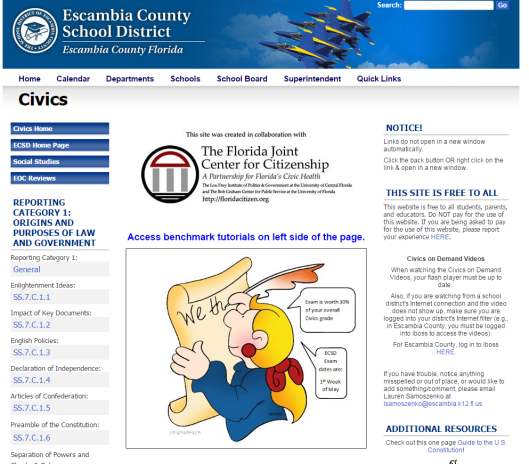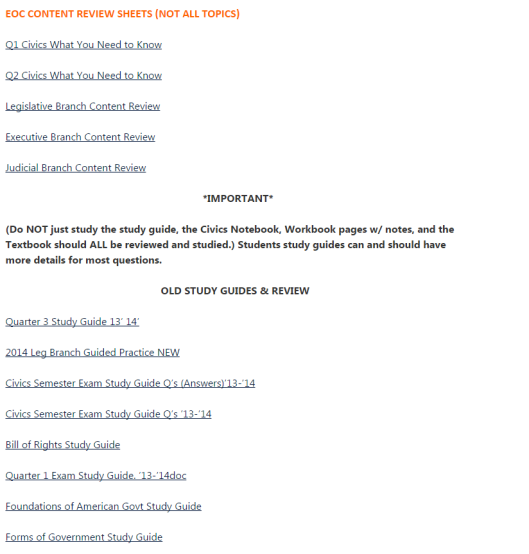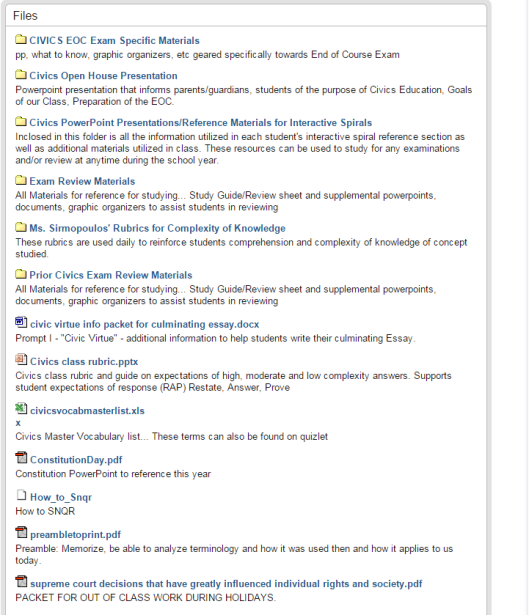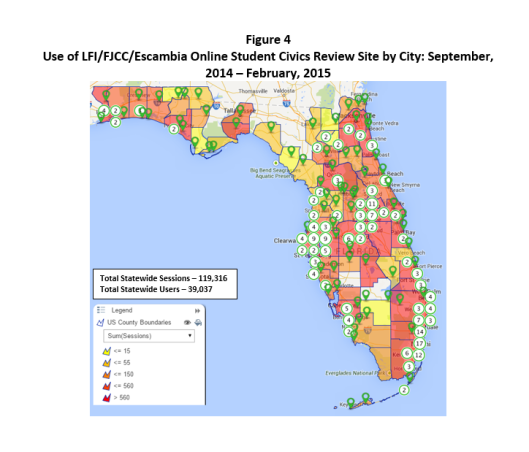The Middle School Civics EOCA is just around the corner, and we have been asked about resources that might be useful in reviewing for the exam. So without further ado, here are some possibilities that could serve you well! I have personally reviewed each of these resources, and am comfortable recommending them to you. And if you have any additions to this compilation, please feel free to share! Click on the link in the heading or in the text to access the resource.
FLDOE 2015 Civics Content Focus Reports

The 2015 Civics Content Focus Reports give you at least some idea of what the test might look like. Be sure to note the cautions on page 9. You will also want to review the Civics EOC Test Item Specifications, which you hopefully have been using throughout the year!
Florida Students Civics Tutorials

We have written about these tutorials before, and they are the first resource I recommend for both instruction and review. They are excellent for a flipped classroom model as well. If you are planning on using them as a review resource, I recommend assigning students only the parts of the tutorials they need, and it would be more effective to perhaps set these up in learning stations across the classroom. You could require that students screen-capture or write down responses to the assessment elements in order to ensure completion and comprehension.
Escambia County Civics EOC Review Site

The Escambia site is one that we helped develop, so we do have some attachment to it, but we also believe that the Student Friendly Readings for each benchmark clarification, as well as the assessment items (with answers) and Quizlet vocabulary review tool can serve you well in a review effort. Students can use each of the one page readings to refresh key content that they need, and it lends itself well to a learning center or small group model of review.
Florida Virtual School Resources
 The recorded review sessions, available for free at the bottom of the FLVS page, do a good job covering elements of each of the four reporting categories that will be assessed on the EOC. Because they are about 2 hours long, you will want to preview each one and determine where you might want students to focus their attention. They may also provide you with a model for your own approach to classroom-based reviews. I especially appreciate how an effort is made to integrate assessment elements. Please be aware that you will need to download Blackboard Collaborate to run the videos.
The recorded review sessions, available for free at the bottom of the FLVS page, do a good job covering elements of each of the four reporting categories that will be assessed on the EOC. Because they are about 2 hours long, you will want to preview each one and determine where you might want students to focus their attention. They may also provide you with a model for your own approach to classroom-based reviews. I especially appreciate how an effort is made to integrate assessment elements. Please be aware that you will need to download Blackboard Collaborate to run the videos.
You will also want to check out the FLVS Civics EOC Practice test, which may be of use to you. Again, however, this shouldn’t be the first time that students are being exposed to these types and styles of items. Answers to the practice test items are available here. Note that answers are actually explained as well, which is an excellent element of review. I would suggest actually having students explain WRONG answers. If they can tell you why an answer is wrong, they should have a much easier time of figuring out why an answer might be right!
Civics EOC Boot Camp Model
We wrote about this review model last year, and it may be one that you find useful as well. It worked well for Randall Middle School, and it is a positive way to mix things up a little for both you and your students. We explored this model in great detail in this post, and I encourage you to take a look and see if it is something you might like to do.
District Review Sheets and Practice Tests
Many districts have done a good job developing practice tests and review sheets for the EOC. Based on what I have had a chance to see, I can recommend a couple at the least.

Marion County, which has fantastic leadership in the social studies department, has provided teachers and students with an EOC study guide, made up of a mix of short answer questions, EOC style questions, and vocabulary, all of which draw on the test item specifications. All or part of this is something that I encourage you to adapt and adopt for your own review. Even having the students collaborate on the completion of the study guide could be a huge help for them in preparing for the EOC. Note that the guide is developed in conjunction with their own particular pacing guide and text; you can adapt the chapter and unit headings where necessary.

Pasco County has provided a quality practice test as well, though I prefer the FLVS version because of the answer explanations. Still, it is another way to measure student understanding and get a sense of areas of need while also ensuring ongoing exposure to EOC type questions.
TEACHER WEBSITES
Civics With Mr. Kula

Mr. Kula, social studies teacher at Westpine Middle School in Broward County, has compiled a number of quality content rich and illustrated study guides for the Civics EOC that could be useful for you. While they don’t cover every benchmark, what IS there is effective, and broken down by topic. These would be appropriate for students to use in conjunction with a written review or in small groups using an ‘expert group’ teaching model.
Mrs. Hirsch’s Civics Page

Mrs. Hirsch, a teacher at Fruit Cove Middle School in St. John’s County, has gathered a number of excellent tools for EOC review. The EOC Content Review sheets that she has provided are well done and engaging, and definitely worth sharing with your own students:
Q1 Civics What You Need to Know
Q2 Civics What You Need to Know
Legislative Branch Content Review
Executive Branch Content Review
Judicial Branch Content Review
Civics Assessment Strategy Guide

Here is an EXCELLENT and short powerpoint covering strategies for the EOC. I cannot recommend it enough!
Ruckel Middle School Civics Flashcards

Ruckel Middle School, in Okaloosa County, has developed a tool using Quizlet that provides students with flashcards for review. These might be useful as a bellringer or exit slip activity as you wrap up content this year and start to transition to in depth review.
Ms. Sirmopoulos’ Civics Review Materials

Jackie Sirmopoulos, an excellent and wonderfully effective teacher at PK Yonge Lab School in Gainesville, has been teaching Civics, with some of the highest scores in the state, for awhile. She has provided a plethora of useful review materials that I encourage you to explore. I have looked at almost all of them in each folder, and are all well aligned to the benchmarks and useful in helping you start to address possible student deficiencies while ensuring understanding among all of your students.
These are just a few of the quality review resources that you might find beneficial. If you have any additional resources to share, please shoot me an email or leave it in the comments!



















